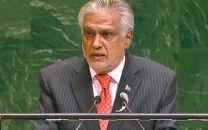SC defines its jurisdiction in service cases
To constitute 'public importance', the matter must go substantially beyond the facts of the case: judgement

Supreme Court. PHOTO: AFP/FILE
The apex court also dilated on "public importance". To constitute "public importance", the matter must go substantially beyond the facts of the case, said the court judgment, authored by Justice Syed Mansoor Ali Shah.
Article 212(3) says: "An appeal to the Supreme Court from a judgment, decree, order or sentence of an Administrative Court or Tribunal shall lie only if the Supreme Court, being satisfied that the case involves a substantial question of law of public importance, grants leave to appeal."
In a first, SJC quizzes LHC judge about delay in cases
The court said that in view of Article 212(3), it is a unique constitutional jurisdiction that is to be exercised if the question of law raised before the court impinges on the rights of the public or a segment of public or a community of civil servants.
According to the judgment, the question of law is "that involves interpretation of the law, rules, instructions, notifications or governmental policy" and "that has not been finally settled by the Supreme Court or is not free from difficulty or ambiguity or calls for discussion of alternative views".
It added that the question of law is that "highlights a state of uncertainty in the law, arising from a contradictory precedent" or "that points out blatant abuse of due process, may pass for a substantial question of law of public importance".
"On the other hand a mere factual inter-party dispute, devoid of the nature of questions of law, mentioned above, will not attract the jurisdiction of this court under Article 212(3) of the Constitution", the judgment said.
The court also cited Order XXIV of the Supreme Court Rules, 1980. It said under the Order XXIV a "petition for leave to appeal from the judgment, decree or order of an Administrative Court or Service Tribunal shall specify succinctly in separate paragraphs, the substantial questions of law of public importance upon which leave is sought".
To constitute "public importance", the judgment held that the matter must go substantially beyond the facts of the case. "It is not sufficient that a question of law arises in the case, but whether the question of law transcends the facts of the individual case and is substantial enough to have a significant bearing on the public interest".
"In the context of service laws a substantial question of law of public importance is a question that may arise out of a case but then surpasses the parties to the case, and has an overarching effect on the public or a community or a class of civil servants."
To determine what might constitute a substantial question of law of public importance under Article 212(3), the court said that a good test is to determine whether any decision by this court in the matter will have a bearing on the public or on the rights of a community or segment of civil servants and will not be restricted to the parties to the case."
It added: "The remedy under Article 212(3) is, therefore, not an appeal in the ordinary sense of the word but is a unique constitutional jurisdiction that is to be exercised if the question of law raised before the Court impinges on the rights of the public or a segment of public or a community of civil servants."
The court said that the framers of Constitution, by giving exclusivity to the constitutional jurisdiction under Article 212(3), also underlined that the tribunal is the final forum of fact and the law. The verdict reminds that a civil servant has a remedial structure of in-house appeal or representation before the authority concerned and then the facility of appeal before the service tribunal.
"This adjudicatory or dispute resolution process reaches finality at the Tribunal unless the aggrieved party can invoke the constitutional jurisdiction under Article 212(3) by raising substantial question of public importance," the ruling said.



















COMMENTS
Comments are moderated and generally will be posted if they are on-topic and not abusive.
For more information, please see our Comments FAQ